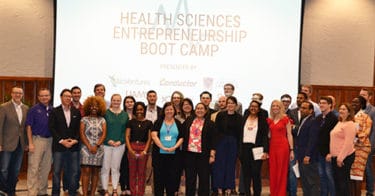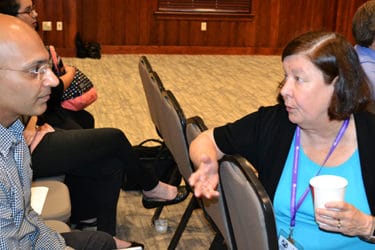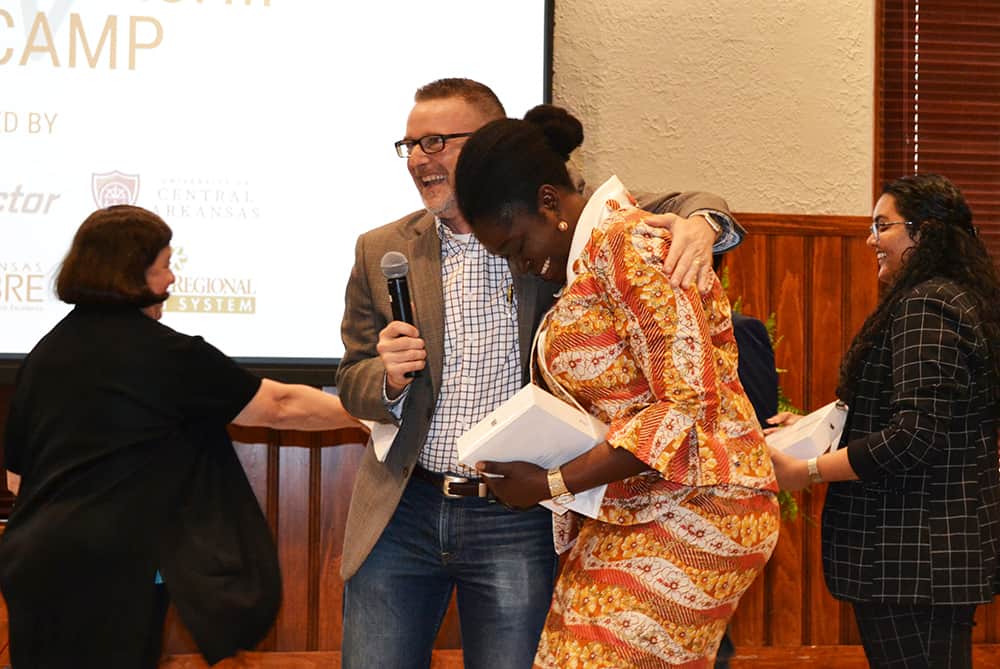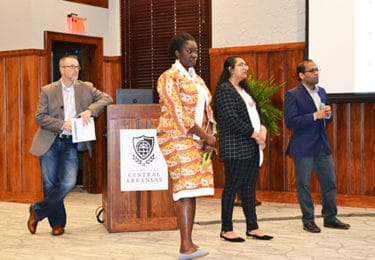Health Sciences Boot Camp Shows Students Possibilities in Business
| Judges had a harder time choosing a winner than in past years of the Health Sciences Entrepreneurship Boot Camp because all the team presentations were so strong, according to one organizer. But, after much debate, PAKI Solutions earned the win.
Eighteen undergraduate and graduate students from across Arkansas went through the fourth annual boot camp May 19-24 on the University of Central Arkansas campus in Conway. The boot camp was a joint initiative of UAMS, Arkansas INBRE, BioVentures and The Conductor, a public-private partnership with UCA and Startup Junkie. Arkansas INBRE (IDeA Networks of Biomedical Research Excellence) helps build research infrastructure across the state.

The entire class of the 2019 Health Science Entrepreneurship Boot Camp and some of the students’ instructors and mentors take a moment for one last photo before the end of the weeklong course.
Organized into six teams of three students each, each team was directed to come up with a business proposal and present it May 24 to a four-judge panel as part of a final competition. The judges were Lawrence Cornett, Ph.D., UAMS associate vice chancellor for research; Jay Gandy, Ph.D., interim dean of the College of Public Health and chair of the Department of Environmental and Occupational Health in the college; James Reed, Conway Regional Medical Center chief information officer; and Tom Kelly, Ph.D., associate professor in the Division of Experimental Pathology in the College of Medicine Department of Pathology.
Ideas ranged from a company to connect community hospitals to health care companies for pilot studies to a service to customize electronic health records to individual users.
PAKI (Prediction of Acute Kidney Injury) Solutions proposed a new service using software in hospital computer systems to identify early patients at risk for kidney injury and to take steps to prevent that injury from occurring.

Nancy Gray, Ph.D., right, visits with a student at the boot camp just before the teams make their presentations.
“It was a fun experience,” said Selom Ayawovi Ametepe, a PAKI team member and student at University of Arkansas, Fayetteville. “I came here with no background in entrepreneurship. Today, I can say I learned a lot. It’s like going from a one to a 10, the highest. Our mentors were great help and support. They were great at guiding us from a very broad problem to a very specific one, kidney injury cases.”
Ametepe’s fellow team members were: Mahanaz Syed, a UAMS student, and Bhavya Patel, a junior at the University of Arkansas at Little Rock. Patel is also a Facebook Connections Fellow who is interning at BioVentures this summer.
The Boot Camp curriculum is designed to give them knowledge and tools they need to think critically, learn entrepreneurial principles and launch innovative ventures. Additionally, the camp offers leadership, team building and other recreational experiences.
The first class at UAMS had 14 graduate students and postdoctoral students. Two of the students started their own companies. In 2017, the boot camp had 18 students from 10 schools. Two teams went on to compete in the 2017 Donald W. Reynolds Governor’s Cup collegiate business plan competition and one won the $25,000 top prize.
The boot camp itself has earned national honors, In 2018, the program won a second-place Innovations in Research and Research Education Award from the Association of American Medical Colleges.
“We’re seeing increased national interest now and are figuring out ways we can disseminate this camp around the country. We hope other states can offer this experience to students,” said Nancy Gray, Ph.D., president of BioVentures. “We’re the first in the country to have a program like this.”
To illustrate her point, Gray introduced to the audience Mary Tapolsky, Ph.D., assistant director, external programs for Forcht Center for Entrepreneurship, College of Business, University of Louisville. Tapolsky came to the Boot Camp to observe the class and to see how something similar might be done at her university. She also was one of the mentors to PAKI Solutions.
Jeff Standridge, chief catalyst for the Conductor, said he recently received a call from a 2018 graduate of the Boot Camp who thanked him for the program. He told Standridge he never had imagined a career in the health care industry, but now he plans to pursue a master’s degree in either business administration or health care administration.
“Even if you never see yourselves owning a health sciences company, or any company, the skills and disciplines you’ve learned are transferable,” Standridge said. “Established firms and organizations are looking to hire, grow and promote innovative entrepreneurs. I urge you to continue to study entrepreneurship because it can help you in almost any setting.”

